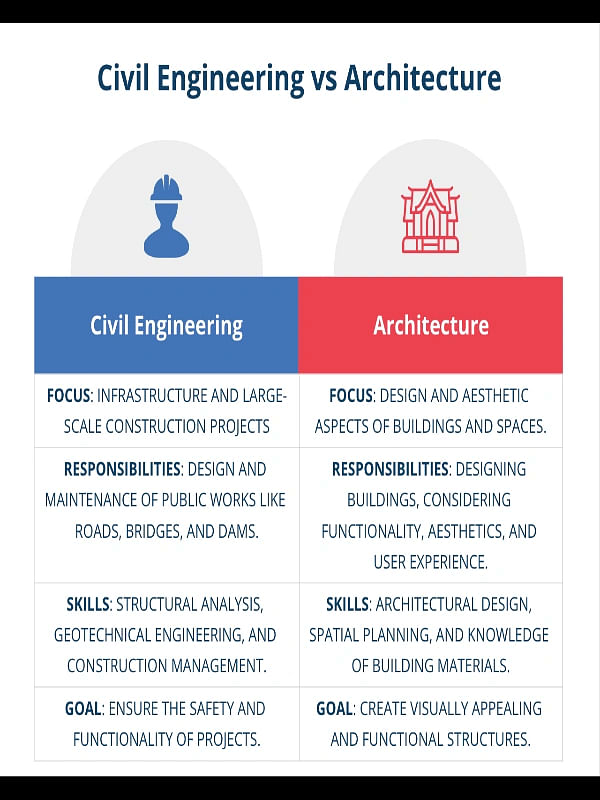Civil Engineering teaches students about statistical analysis, while Architecture students learn about structure design, planning of a structure.
Civil Engineering vs Architecture: Civil engineering teaches students about the construction, planning, and construction of broad-scale construction projects like dams, roads, smart cities, and so on, whereas architecture emphasises the design, sustainable technology, and architecture of buildings, factories, and other structures.
Students learn technical skills, communication, project management, critical thinking & design and implementation while advanced mathematics, computer skills, building code knowledge & business understanding skills in Architecture.
Civil engineering is more inclined towards design and construction elements, while Architecture is more concerned with enhancing the spatial functionality and aesthetics of buildings.
Civil Engineering vs Architecture Courses: Overview
In between civil engineering and Architecture, one focuses on essential construction and design elements. At the same time, the other is more inclined towards the structure type, structure design, structure format, etc. Below are some highlights of civil engineering and Architecture.
| Particulars | Civil Engineering | Architecture |
|---|---|---|
| Name of the Course | Civil Engineering | Architecture |
| Course Duration | 4 years | 4 years |
| Course Fees | INR 2 L to INR 6 L | INR 3 L to INR 7 L |
| Required Entrance Exams | JEE Main, JEE Advanced, SRMJEEE etc. | JEE Main, JEE Advanced, KITEE, WBJEE etc. |
| Average Salary | INR 3.46 LPA to INR 6.60 LPA | INR 3 LPA to INR 12 LPA |
Also Check: Courses After 12th: Commerce, Science, Arts
Civil Engineering vs Architecture: Eligibility Criteria
As Civil Engineering and Architecture are specialisations in engineering, the courses have similar entry requirements. Candidates can go through the eligibility criteria for civil engineering vs. Architecture.
- Candidates must study PCM or science stream in their 10+2 with 50% from a recognised board for a bachelor's degree.
- Students must score the entrance exams cutoffs or more for admission to top engineering colleges in India.
- Candidates must score at least 50% in their bachelor's degree for admission to masters in engineering courses.
- Students wanting to study abroad must clear English proficiency tests like IELTS, TOEFL, etc and international entrance tests like SAT/GRE/GMAT for studying overseas.
Civil Engineering vs Architecture: Key Differences

There are specific differences between civil engineering and Architecture, as one is more construction, and the other is a more design-focused course. Below are the differences between civil engineering and Architecture.
- Specialisations: In civil engineering courses, students are taught about the construction of buildings and infrastructure, techniques & methods, while in Architecture, students are taught about designing with spatial utility and an artistic appearance of the structure.
- Focus Area: Civil engineering primarily focuses on constructing and modifying architects' ideas & innovation, whereas Architecture courses emphasise building shape, colour and space designs.
- Eligibility: Civil engineering courses for some universities require a diploma in civil engineering, which is not the case for Architecture.
- Responsibilities: Civil engineers work on a construction project or design, while architectural engineers are responsible for designing a project or construction.
Also Check: Engineering Courses after 12th: Eligibility, Admission, Top Colleges
Civil Engineering vs Architecture: Top Colleges
As civil engineering and Architecture are engineering specialisations, there are some top engineering colleges for students to study civil engineering and Architecture. Below is the list of colleges for both engineering specialisations.
Top Colleges for Civil Engineering
The top colleges in Civil Engineering consist of IITs, NIT, Jadavpur university etc. The course fee ranges for INR 8.4 K to INR 10 L respectively. Below given are the list of top 10 colleges for civil engineering in India.
| NIRF Ranking | College Name | Course Fees |
|---|---|---|
| 1 | IIT Madras | INR 3,00,464 |
| 2 | IIT Delhi | INR 8,81,200 |
| 3 | IIT Bombay | INR 9,12,000 |
| 4 | IIT Kanpur | INR 9,71,600 |
| 5 | IIT Roorkee | INR 8,54,000 |
| 6 | IIT Kharagpur | INR 3,60,368 |
| 7 | IIT Guwahati | INR 8,71,000 |
| 8 | IIT Hyderabad | INR 9,46,000 |
| 9 | NIT Trichy | INR 6,47,000 |
| 10 | Jadavpur University | INR 8,400 |
Top Colleges for Architecture
The top architecture colleges consist of colleges like IIT, NIT, AMU etc after clearing the architecture entrance exams after 12th. The course fees ranges for INR 2 L to INR 18 L respectively. Candidates can go through the top architectural colleges and the course fees stated below.
| NIRF Ranking | College Name | Course Fees |
|---|---|---|
| 1 | IIT Roorkee | INR 9,00,000 |
| 2 | NIT, Calicut | INR 7,00,000 |
| 3 | IIT Kharagpur | INR 10,91,200 |
| 4 | NIT Trichy | INR 6,25,000 |
| 5 | School of Planning and Architecture, New Delhi | INR 2,44,000 |
| 6 | Jamia Millia Islamia,New Delhi | INR 1,42,000 |
| 7 | Centre for Environmental Planning and Technology University | INR 12,00,00 |
| 8 | National Institute of Technology, Rourkela | INR 4,50,000 |
| 9 | Aligarh Muslim University | INR 13,27,000 |
| 10 | Indian Institute of Engineering Science and Technology, Shibpur | INR 4,00,000 |
Also Check: Architecture Courses after 12th: Top Colleges, Eligibility, Job Scope
Civil Engineering vs Architecture: Career Scope
A wide range of opportunities are available for civil engineering and Architecture. Civil engineering candidates can earn up to INR 20 L, while architectural engineers can earn up to INR 40 L annually based on their skills & experience. Candidates can review the job roles for each career with an annual salary below.
Career Scope of Civil Engineering
Civil engineering graduates can work as civil, construction, and structural engineers. Below are some job titles that civil engineering graduates can work after completing their course.
| Job Roles | Average Salary |
|---|---|
| Civil Engineer | INR 3 Lakh |
| Construction Engineer | INR 2.5 Lakh |
| Structural Engineer | INR 5.7 Lakh |
| Environmental Engineer | INR 6 Lakh |
| Site Engineer | INR 6.2 Lakh |
Also Check: Civil Engineering Salary in India, Jobs and Scope
Career Scope of Architecture
Architecture graduates can work as designers, architects, interior designers, urban planners, etc. Candidates can go through the job scope for architectural engineers with the annual salary structure stated below.
| Job Roles | Average Salary |
|---|---|
| Architectural Engineer | INR 6 Lakh |
| Interior Designer | INR 4.3 Lakh |
| Urban Planners | INR 6 Lakh |
| Architect | INR 3 Lakh |
| Design Architect | INR 3.5 Lakh |
Also Check: B.Arch Salary, Jobs, Scope, Placements in India
Civil Engineering vs Architecture: Top Recruiters
Top recruiters in civil engineering consist of construction companies, while architectural engineers are recruited in the construction design industry. Below given are some of the leading recruiters for civil and chemical engineering.
| Top Recruiters for Civil Engineering Course | Top Recruiters for Architecture Course |
|---|---|
| Hindustan Construction Company | RSP Architect Limited |
| Punj Loyd | ARCOP |
| Tata Projects | Raj Rewal Associates |
| Gammon India Pvt | Gaursons India |
| BGR Energy Systems Pvt | C P Kukreja Associates |
| DLF | Oscar & Ponni Architects |
Also Check: NIRF Architecture Ranking 2023: Top 30 Colleges List With Scores
Which is Better: Civil Engineering vs Architecture?
Candidates must remember specific pointers while choosing the best career path in civil and Architecture. Students can go through the tricks to select the right course for higher studies.
- Students more interested in building a structure and laying the foundations for longevity must select civil engineering, while candidates interested in design can go for Architecture courses.
- Candidates having a creative inclination about a structure must study Architecture, while students more technically inclined towards a design must select Architecture.
- Architecture courses are for four years, while civil engineering courses are for three years; therefore, students must also consider the course duration for each specialisation before finalising.
Also Check: Government Jobs vs Private Jobs: What's the Difference?









